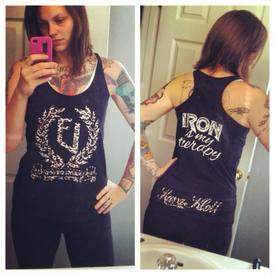How true are MFP's Exercise Calories Burned?

Meloyelo2010
Posts: 171 Member
Does anyone know the validity of them? My friend is questioning them. Thanks!
0
Replies
-
I think the general opinion is that they overestimate. I use a different calorie calculator app (mobile version of http://www.healthstatus.com/calculate/cbc) but I would LOVE a HRM.0
-
I personally don't trust MFP's estimates. I use a chest strap HRM and the values from there are always higher or lower, and rarely within 20 kcals of MFP's readings (20 cals from a 150-200 cal walk to work is a substantial difference).
Invest in a HRM. It'll be the best money you could spend.0 -
I checked mine and adjusted using a bodybugg, until I gave up the subscription
I would try to fact check them as much as possible.0 -
I assume they over estimate a lot but some things are pretty accurate. The biggest problem if a 6'4'' 325lbs man runs 6mph for 30 minutes he is going to burn a lot more calories than a 5' 4'' 130lbs girl.0
-
They've always seemed high to me. I don't trust it.0
-
MFP bought a database, or maybe it's free, don't know, that many other sites use.
As such the original parameters seem to have been lost.
How many and what was the avg person in the studies the data was based on, and what kind of intensities (as measured by HR) did they perform at?
If there was a variety of ages and weights in the study, and that is taken into account, that is great.
But the same database MFP uses elsewhere only cares about weight, not gender or age, so it loses accuracy over that.
Walking and jogging on treadmill flat is about the only activities that can be decently accurate, as it's pretty known how much energy is needed to move so much mass so much distance.
But you may have some weeks where out of shape you actually burn more, and then get into much better shape and burn less.0 -
they seem to be too high..but I use a sport tracker on my phone and it calculates my calories burned as I do my workouts. It's more accurate that way I think. But only way to know if to buy a heart rate monitor I guess.0
-
I wouldnt trust MFP's estimates, or any other for that matter. Plain and simple..the body is way too variable to ever get an accurate representation of what its actually doing. What ive always done is on training days (6 out of 7 days), just hit maintinance calories and let the exercise create the deficit for you. Obviously if you run 10 miles you need to eat alittle more, but just go by feel0
-
i trust them! they very closely match the numbers of my $120 heart rate monitor... make sure to only count the time you're actually working0
-
MFP can't analyze your level of effort for any activity and therefore will most likely be off. I find some exercises match my HRM exactly, some are high, some are low. It mostly depends on how difficult the exercise is for me. Swimming is always way high, "Walking 4.5" is always low because 4.5 is closer to a jog for me. I find that when I'm getting a good sweat I roughly burn 10cals a minute so I use that as a general guideline when I dont have my HRM on me.0
-
They are way off compared to my HRM.0
-
I love it some are on point, other mostly on point and others not so on point. Bottom line I need to invest if an HRM.0
-
I will second the HRM opinion. Go get one, even a cheaper one is fine as long as it calculates out calories burned.
My personal opinion for what I log is I choose the lowest of the 2 or 3 answers I have. At the gym on the elliptical, treadmill, stairmaster cardio equipment I have what the machine says (and always input age / weight stats), my HRM and the MFP estimate. When I run outside I have my HRM and MFP. All of the values are different. I choose to log the lowest. In the gym on the elliptical, MFP has always been the highest. The elliptical machine was the lowest but as I've gotten in better shape my HRM now records a lower calorie burn, so I now log the HRM results. On my training runs outside, MFP is a little lower than my HRM so I log what MFP gives me. That's just my choice, but it's worked fine for me so far.0 -
To figure out true calories your body burns you have to calculate your body composition, lean muscle/fat/static tissue, then figure out the percentage muscle used per activity to calculate the amount of energy needed to move the muscle. Last I read active lean muscle burns approx 2.4 kcal/kg/hour, adipose (fat) burns roughly .3 kcal/kg/hour. All this is based on averages, if your fat cells have an high mitochondrial make up (brown fat cells) they burn more fat when stimulated to release fat to be used as an energy substrate because they have a lot of mitochondria where fat is used to power the Krebs cycle of energy metabolism. Each triglyceride (fat molecule) provides 36 ATP after getting glycolysis, the ETC and the Krebs cycle. See this website, although not where I learned this this website provides an idea of the process, there is a lot more to energy metabolism. ATP is what is used as the major energy catalyst by mammalian body to perform life functions. http://www.uic.edu/classes/bios/bios100/summer2002/lect10.htm0
-
Whether or no they're exact is very difficult as each of us has a different body composition. They are averages, just do the work and you'll be good, or get a hold of some good irisin and you'll become huge with little work lol.0
-
To figure out true calories your body burns you have to calculate your body composition, lean muscle/fat/static tissue, then figure out the percentage muscle used per activity to calculate the amount of energy needed to move the muscle. Last I read active lean muscle burns approx 2.4 kcal/kg/hour, adipose (fat) burns roughly .3 kcal/kg/hour. All this is based on averages, if your fat cells have an high mitochondrial make up (brown fat cells) they burn more fat when stimulated to release fat to be used as an energy substrate because they have a lot of mitochondria where fat is used to power the Krebs cycle of energy metabolism. Each triglyceride (fat molecule) provides 36 ATP after getting glycolysis, the ETC and the Krebs cycle. See this website, although not where I learned this this website provides an idea of the process, there is a lot more to energy metabolism. ATP is what is used as the major energy catalyst by mammalian body to perform life functions. http://www.uic.edu/classes/bios/bios100/summer2002/lect10.htm
Thank you for the link!0 -
I think they are a general estimate. I mean can you really tell how vigorous I am doing any exercise. I have always utilized them as an estimate and I am very careful not to "eat" my exercise calories based on my entries. I am also skeptical of the calories in food that I am entering. Even some of my labels are WRONG! The scale can lie, clothes sizes can lie, but the truth for me is "Can I button my pants"? If they are loose I am loosing weight. If they are tight, I am gaining weight. I can also tell about the intensity of my workouts and if I am really getting a good one in. My exertion levels are a realistic judge of any entry I enter. Does 10- 50 calories underestimate of overestimate really matter to me? Not unless I want to eat them back. I will research HRM. However, so far so good.0
-
I had to tweak everything DOWN - big time.
I burn from 450 up to 600 calories per hour doing different types of cardio.
And the fitter I get, the more intense my training must be to earn those higher burns.
At some point, I just stopped increasing the training and am happy where I am.
I try to change everything up just to keep my body guessing. Maybe that helps - who knows?0 -
I check against this site too and its close.I think the general opinion is that they overestimate. I use a different calorie calculator app (mobile version of http://www.healthstatus.com/calculate/cbc) but I would LOVE a HRM.0 -
Many are saying it's best to get a HRM. So what are the reviews on brands/models? Any suggestions?
I'm just checking REI, for instance. There are many on the market...
http://www.rei.com/search?cat=4500567&jxTracks+calories+burned=Tracks+calories+burned 0
0 -
For running at least you can use an app. I run 3 gps apps on my phone (Nike+, Endomondo and iSmoothRun which syncs to RunKeeper). End result is that I get 4 (RunKeeper takes the app data and uses its own calorie algorithm on it) which take into account my pace, weight and even the cadence of my stride.I assume they over estimate a lot but some things are pretty accurate. The biggest problem if a 6'4'' 325lbs man runs 6mph for 30 minutes he is going to burn a lot more calories than a 5' 4'' 130lbs girl.
I always use the lowest # of calories, but usually all the apps are close. And nowhere near MFP. 0
0 -
They are low for me so I calculate my own calories burned by heart rate
 0
0 -
using my HRM and in comparison, I have found MFP's numbers some are high and some are lower than my HRM. So needless to say I dont exactly trust them but for a general guideline for those without a HRM, guesstimate a little lower than MFPs numbers0
-
I find most are high. My HRM says elliptical today was 535, MFP says 720. If people trust those numbers and eat back calories they will be sadly disappointed.0
-
I assume they over estimate a lot but some things are pretty accurate. The biggest problem if a 6'4'' 325lbs man runs 6mph for 30 minutes he is going to burn a lot more calories than a 5' 4'' 130lbs girl.
It does take weight into consideration - my exercise calories burned go down as I lose weight (based on the same exercise).
I just got an HRM - but am finding the numbers to be pretty close - withing 5% most of the time. Perhaps it overadjusts for the weight difference and is closer now that I'm getting closer to a healthy BMI?0 -
I generally doc my time by about 5 mins or so. So if I go on a 60 minute walk I reduce the time I input on MFP, I eat my exercuse cals so Id rather not over eat them0
-
I have read that heart rate monitors really aren't that accurate at estimating calories burned. Even this article that states Polar heart rate monitors are pretty good say they are only about 75% accurate (http://www.livestrong.com/article/490909-the-accuracy-of-calories-burned-in-polar-heart-rate-monitors/). I have no idea if their numbers are right, but I have seen many places saying heart rate is not a good predictor of calories burned. Even devices such as the Bodymedia Fit and BoduBugg don't even use heart rate at all because they say it doesn't add value to their methods. I wear a heart rate monitor and like it, but I'm not sure the calories are accurate. My Garmin 305 was usually within 10% or so of my Bodymedia Fit, but I think it uses distance ran, weight, and gate to estimate calories.
Also, heart rate monitors typically only do a decent job with activities like walking and running, not strength training: http://www.sparkpeople.com/community/ask_the_experts.asp?q=750 -
I personally don't trust MFP's estimates. I use a chest strap HRM and the values from there are always higher or lower, and rarely within 20 kcals of MFP's readings (20 cals from a 150-200 cal walk to work is a substantial difference).
Invest in a HRM. It'll be the best money you could spend.
This. The difference from before I got my heart rate monitor till now is amazing. I burn way more than MFP suggests.0 -
it's definitely over the actual amount. Compared to the HRM its at minimum 100 or more calories higher0
-
MFP is always much lower than my HRM when it comes to walking. Turbo Jam is pretty close, though.
I use a Timex HRM, and I calculate my BMR for my exercise time so I can subtract it from my HRM reading.
Example: my BMR divided by 24 hours is 53, so if I exercise for an hour, I subtract 53 from the total on my HRM.0
This discussion has been closed.
Categories
- All Categories
- 1.4M Health, Wellness and Goals
- 398.2K Introduce Yourself
- 44.7K Getting Started
- 261K Health and Weight Loss
- 176.4K Food and Nutrition
- 47.7K Recipes
- 233K Fitness and Exercise
- 462 Sleep, Mindfulness and Overall Wellness
- 6.5K Goal: Maintaining Weight
- 8.7K Goal: Gaining Weight and Body Building
- 153.5K Motivation and Support
- 8.4K Challenges
- 1.4K Debate Club
- 96.5K Chit-Chat
- 2.6K Fun and Games
- 4.8K MyFitnessPal Information
- 12 News and Announcements
- 21 MyFitnessPal Academy
- 1.6K Feature Suggestions and Ideas
- 3.2K MyFitnessPal Tech Support Questions





















